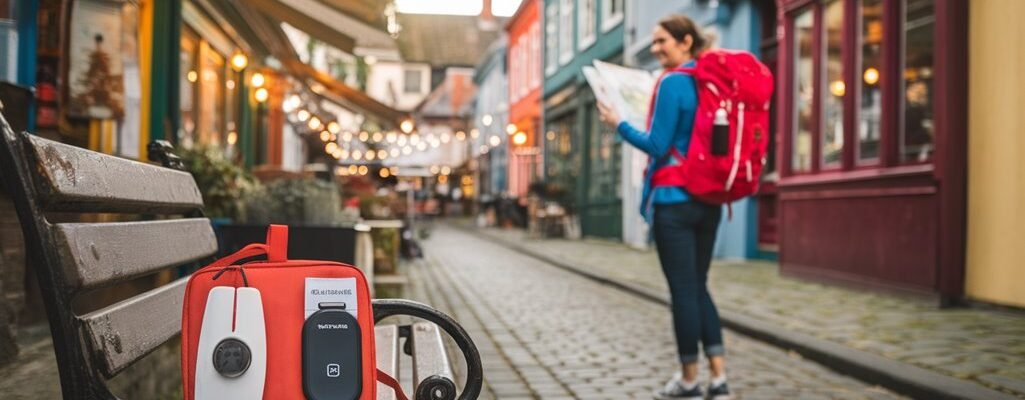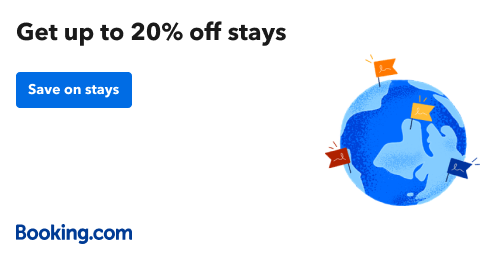
Safety Tips Every Solo Traveler Should Know
When you're traveling solo, prioritizing your safety is essential. Start by researching your destination to understand local customs and potential risks. Always share your itinerary with trusted friends and keep them updated. Stay aware of your surroundings and trust your instincts—if something feels off, reassess. Choose accommodations wisely; look for safe areas and use secure storage for your valuables. Opt for reliable transportation options like ride-sharing services. Finally, maintain regular communication with loved ones and know your emergency contacts. Follow these tips, and you'll be set for a safer journey ahead, with more insights waiting just around the corner.
Research Your Destination
When planning your solo adventure, diving into the details of your destination can make all the difference. Understanding local customs and cultural norms isn't just about fitting in; it's about enhancing your experience and ensuring your safety.
Imagine wandering through vibrant markets, savoring exotic dishes, or striking up conversations with locals. Knowing what's appropriate can help you avoid misunderstandings and foster meaningful connections.
Start by researching the social etiquette of your chosen locale. Do people greet with a handshake or a bow? Are there dress codes for specific areas? Familiarizing yourself with these nuances will empower you to navigate the environment with confidence.
Next, explore the local cuisine. Knowing what to expect can enrich your culinary journey, and trying traditional dishes can lead to unforgettable experiences. Seek out reviews or blogs that shed light on lesser-known eats, where locals gather.
Finally, familiarize yourself with the local laws and public behavior. Understanding cultural norms can help you avoid unintentional faux pas.
Share Your Itinerary
Sharing your itinerary is a smart move that adds an extra layer of safety to your solo travels. When you let someone know your plans, you create a safety net that can be invaluable. Whether it's a trusted friend, family member, or even a travel buddy, having someone in the loop means someone will notice if things don't go as planned.
Consider using apps or services that facilitate itinerary sharing. They often have features for real-time travel updates, allowing your loved ones to track your journey without constant check-ins. This way, you maintain your freedom while ensuring someone knows your whereabouts.
Be clear and specific about your travel schedule, including your accommodations, transportation methods, and significant stops. Update your itinerary if plans change; keeping your contacts informed can provide peace of mind for everyone involved.
While you're embracing the thrill of going solo, remember that a little preparation goes a long way. By sharing your itinerary, you're not just safeguarding yourself; you're enhancing the overall experience, making your adventure more enjoyable and secure.
Stay Aware of Your Surroundings
Staying aware of your surroundings is crucial for any solo traveler. When you're exploring new places, situational awareness becomes your best friend. Tune into the environmental cues around you—notice the hustle and bustle of the market, the quiet alleyways, or the locals' body language. These subtle signs can reveal a lot about where you're and help you gauge whether you're in a safe environment.
Keep your head up and your senses sharp. Trust your instincts; if something feels off, it probably is. Avoid distractions like your phone while walking in unfamiliar areas. Instead, take in the sights, sounds, and smells that make your journey unique. When you stay present, you're more likely to spot any potential risks before they escalate.
Consider creating a mental map of the area you're in. Identify landmarks and safe spots, like cafes or shops, where you can retreat if needed.
Choose Accommodations Wisely
Choosing the right accommodations can make or break your solo travel experience. Whether you prefer the cozy intimacy of a boutique hotel, the vibrant energy of a hostel, or the independence of an Airbnb, each accommodation type offers a different vibe.
Think about what you value most: privacy, social interaction, or a home-like feel.
As you explore booking platforms, like Booking.com or Airbnb, read reviews and take note of the location. A centrally located spot can save you time and money, allowing you to dive into local culture without hassle.
Also, consider amenities that matter to you—free Wi-Fi, breakfast options, or even a kitchen for those moments when you want to whip up a meal.
Don't forget to check cancellation policies, especially in uncertain times. Flexibility can offer peace of mind.
Trust your instincts; if a place feels off, it probably is. Remember, your accommodations should complement your adventurous spirit, providing a safe haven to recharge between your escapades.
Keep Valuables Secure
After settling into your accommodations, the next step is to ensure your valuables remain secure during your adventures. You want to explore without the nagging worry of losing your belongings.
Investing in some reliable anti-theft gear is a game changer. From lockable backpacks to hidden pockets, these items provide peace of mind while you're out and about.
When you're not using your valuables, make use of secure storage options. Most accommodations offer safes, but if yours doesn't, consider using portable locks or cable locks for your bags.
You can even stash your essentials in less obvious places, like a locked suitcase or a decoy wallet.
Always keep a close eye on your belongings, especially in crowded areas. It's easy for pickpockets to target distracted travelers.
If you're in a café or on public transport, keep your bag on your lap or securely strapped to you.
Blend in With Locals
When you immerse yourself in local culture, it not only enriches your travel experience but also helps you blend in and feel more at ease. Start by observing local customs—what's the dress code? Are there specific gestures or greetings? Adapting your behavior can make you less noticeable as a tourist, and locals often appreciate your effort to respect their way of life.
Learning some language basics is another powerful tool. Even a few simple phrases can open doors and spark friendly conversations. Try practicing greetings, thank-yous, or menu items. Locals will likely be impressed by your willingness to communicate, and it can lead to authentic interactions.
Consider dining where locals eat, rather than tourist traps. This not only introduces you to authentic cuisine but also places you in the heart of local life. Small markets and street vendors often provide insight into the community's rhythm.
Finally, be mindful of your surroundings. Engage with people around you, listen actively, and embrace the spontaneity of your journey. By blending in, you'll not only enhance your safety but also create memorable experiences that truly capture the essence of your adventure.
Use Trusted Transportation
Navigating a new city can feel overwhelming, but sticking to trusted transportation options can ease your journey. Whether you're zipping through bustling streets or taking a scenic route, your choice of transport can make all the difference.
Ride sharing services like Uber or Lyft offer a reliable way to get around, allowing you to request a ride at a moment's notice. Just ensure you're confirming the driver's details before hopping in.
Local transport can also be an exciting way to soak up the culture. Buses and trams often provide a glimpse into everyday life, and they're usually budget-friendly. However, do a bit of research beforehand. Familiarize yourself with the schedules and routes to avoid any surprises.
When using public transport, keep an eye on your belongings and be aware of your surroundings—safety first!
Lastly, consider using transportation apps to navigate and plan your trips. They can help you find the best routes and avoid potentially unsafe areas.
Stay Connected With Friends
Staying connected with friends while traveling solo can enhance your experience and provide an added layer of safety. Regularly updating your loved ones about your whereabouts not only reassures them but can also act as a safety net if things go awry. Share your travel itinerary through social media platforms, or use messaging apps to keep the communication flowing. Consider posting photos and experiences to give friends a glimpse into your adventures.
Additionally, downloading emergency apps can be a game-changer. These apps can share your location in real-time or alert your contacts in case of an emergency. Set up a trusted group of friends or family members who can be your safety network. Inform them of your plans, and don't hesitate to reach out if you ever feel uneasy or need assistance.
Make it a habit to check in regularly, even if it's just a quick message. This simple act can make you feel less isolated and more connected to your support system back home.
Enjoying your freedom as a solo traveler is exhilarating, but staying connected ensures you're never truly alone.
Trust Your Instincts
Your instincts are often your best guide when traveling solo. When you're exploring new places, it's easy to get caught up in the excitement, but don't ignore that little voice inside you. That voice is your intuition, a powerful tool honed through self-awareness practices. Pay attention to how you feel in different situations—trusting your gut can lead you to safety and fulfillment.
Engage in intuitive decision making as you navigate unfamiliar environments. If something doesn't feel right, whether it's a shady alley or an unwelcoming vibe from locals, listen to those feelings. It's perfectly okay to change your plans or retreat to a safer space.
Remember, your freedom to roam is only as rewarding as your ability to stay safe.
Take time to reflect on your experiences and feelings during your travels. This self-awareness will sharpen your instincts, making them even more reliable. By tuning into your intuition, you'll not only enhance your travel experiences but also empower yourself to explore boldly and confidently.
Ultimately, trusting your instincts is about embracing your journey while keeping your safety at the forefront.
Know Emergency Contacts
When traveling solo, knowing emergency contacts can be your lifeline in unexpected situations. Before you set off on your adventure, take the time to gather essential numbers. Write down local emergency services, like police, fire, and medical assistance, so you can reach them quickly if needed. Each country has its own emergency number—don't assume it's the same as at home.
Familiarize yourself with local laws as well, since what's acceptable in one place mightn't be in another. Knowing how to navigate the local legal landscape can save you from sticky situations.
Additionally, keep a list of contacts back home, like friends or family, who can help in case of emergencies. Store these contacts in your phone and on paper, ensuring you've got access even if your device fails.
Share your itinerary with someone you trust, so they know where you're and can step in if something goes awry. By being prepared and informed, you'll embrace the freedom of solo travel while keeping safety in mind.
You can explore the world confidently, knowing you've got a plan if the unexpected arises.
Frequently Asked Questions
What Should I Do if I Lose My Passport While Traveling?
If you lose your passport while traveling, stay calm. Immediately contact your country's embassy for passport replacement. Notify your emergency contacts, and gather necessary documents to expedite the process. You'll regain your freedom soon!
How Can I Find Other Solo Travelers to Connect With?
To connect with other solo travelers, explore travel forums and join local meetups. You'll discover adventurous souls sharing experiences, tips, and itineraries, creating friendships that enhance your journey and ignite your wanderlust.
Are There Apps to Help Me Stay Safe While Traveling Alone?
Yes, there are great safety apps you can use while traveling alone. Look for ones that provide travel alerts, location sharing, and emergency contacts. They'll help you feel secure, allowing you to enjoy your adventures freely.
What Should I Pack for a Solo Trip?
For your solo trip, create a packing checklist of essential items like a versatile wardrobe, comfortable shoes, portable charger, travel documents, and a first-aid kit. This'll ensure you're prepared for any adventure that comes your way!
How Can I Handle Culture Shock as a Solo Traveler?
Handling culture shock as a solo traveler requires embracing culture adaptation. Build emotional resilience by immersing yourself in local experiences, connecting with others, and reminding yourself that discomfort often leads to personal growth and newfound freedom.
Conclusion
By following these safety tips, you can embark on your solo adventure with confidence and peace of mind. Researching your destination, sharing your itinerary, and staying aware of your surroundings will empower you to explore freely. Choosing the right accommodations and securing your valuables adds an extra layer of protection. Staying connected with friends and trusting your instincts ensures you're never truly alone. Remember, a little preparation goes a long way in making your journey safe and enjoyable!




